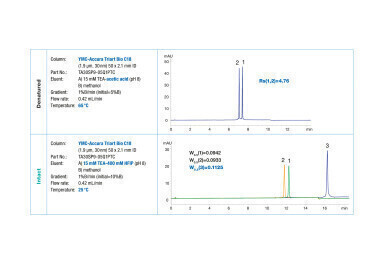HPLC, UHPLC
How to choose the optimum IP-RP conditions for analysis of denatured or non-denatured siRNA duplexes
May 23 2023
Small interfering RNAs (siRNAs) usually occur as oligonucleotide duplexes. They can be analysed under nondenaturing conditions so that duplex formation is assured and excessive single-strands are detected. Alternatively, analysis of siRNAs can be conducted under denaturing conditions so that both sense and antisense strands are monitored. Analysis of siRNA under denaturing and nondenaturing conditions can be achieved by ion pair reversed phase high performance liquid chromatography (IP-RP HPLC). Several parameters influence siRNA separation:
- 1. Column temperature – key factor for the denaturation of siRNA
- 2. Ion pair reagents and acids – affect double-strand stability and separation efficiency
siRNA can be analysed by means of IP-RP in a denatured or non-denatured state. IP-RP can be applied with MS detection. Though, ion pair reagents have a strong influence on ionisation efficiency and sensitivity. This limits the choice of suitable eluent modifier. HFIP is well suited and its compatibility with MS has great advantages. But the higher cost is a disadvantage. Therefore, alternative counter ions, especially for high throughput analyses, need to be considered. However, counter ions such as acetic acid can increase the denaturation of siRNAs. Nevertheless, the analysis of siRNA by IP-RP must always be individually adjusted to the properties of the respective siRNA.
This technical note introduces all relevant aspects of denaturing and non-denaturing IP-RP HPLC. As a sample the siRNA duplex targeting the firefly luciferase gene GL2 consisting of 19 nucleotides was used.
The phosphate-rich backbone of siRNA molecules enables the siRNA to adhere to metal surfaces, including column hardware. To prevent metal surface interaction, all experiments were conducted with a bioinert YMC-Accura Triart Bio C18 column. The bioinert surface coating of column body and frit considerably increases the sensitivity and sample recovery.
Events
Apr 22 2025 Kintex, South Korea
Analytica Anacon India & IndiaLabExpo
Apr 23 2025 Mumbai, India
Apr 27 2025 Portland, OR, USA
May 11 2025 Vienna, Austria
May 18 2025 Tempe. AZ, USA












